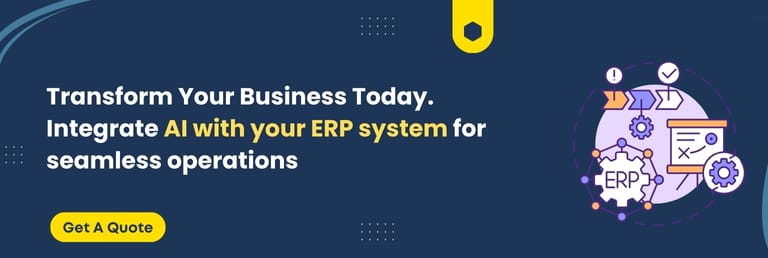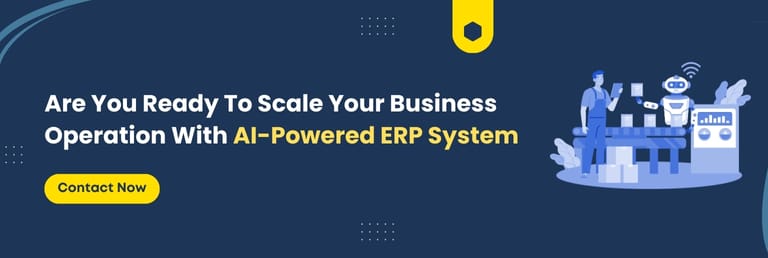How To Integrate AI In ERP Systems For Streamlining Business Process
Keyur Patel
September 12, 2025
10 min
Artificial Intelligence in ERP
In recent years, the integration of Artificial Intelligence in ERP systems has become a significant trend. Companies across various industries are leveraging AI to enhance their ERP systems, making them smarter, more efficient, and more capable of driving business growth. The integration of AI In ERP systems is not just a passing trend but a significant evolution in the way businesses operate.
With the power of AI, companies can achieve greater efficiency, make informed decisions, and provide better customer experiences. As the adoption of AI in ERP continues to grow, businesses that leverage these advanced capabilities will be well-positioned to thrive in an increasingly competitive market. Integrating artificial intelligence in ERP systems has enabled organizations to streamline their business process through machine learning, natural language processing and robotic process automation technologies.
As of 2024, one in six UK businesses has adopted artificial intelligence technology, with the majority citing ‘data management and analysis’ as the primary reason. This underscores the fitting and seemingly limitless potential of integrating AI In ERP systems.
AI for ERP systems offer advanced analytical predictions, enhancing customer relationship management (CRM) with personalized interactions and providing strategic insights for top-level decision-making. Companies leverage these capabilities to drive growth, quickly adapt to market changes, and build competitive advantages.
Types of AI Technologies in ERP
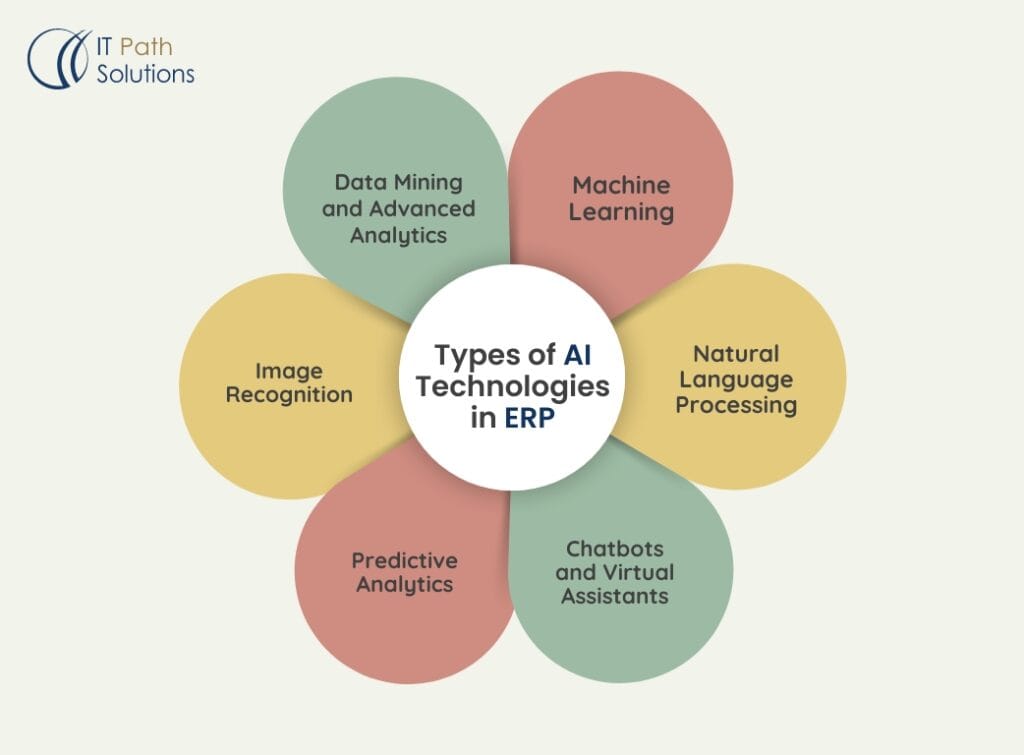
Machine Learning
ML is the new frontier in ERP systems as it empowers the systems to run analyses on large amounts of data and derive patterns that can help in decision-making. The data obtained from the past helps the ML algorithms forecast future trends, control the stock, and enhance demand analysis.
This capability makes it possible for businesses to cut expenses, minimize unnecessary consumption, and boost productivity. Also, it can help in automating repetitive work, thus allowing employees to work on other important tasks.
Natural Language Processing
The ERP system is improved through Natural Language Processing (NLP) because it allows the systems to comprehend the natural language. This technology enables the users to interface with the system via natural language which makes the system more friendly.
In addition, it can be applied for analysis of customers’ feedback, social media conversations, and any other text-based data, which can be helpful for the identification of customers’ attitudes to the products and services, as well as for market trends definition. This deeper understanding assists the organizations in the formulation of strategies and enhancement of the satisfaction level of their customers.
Chatbots and Virtual Assistants
Chatbots and virtual assistants are now regarded as essential components of today’s ERP systems because they provide immediate support and can perform various functions. Such tools can be set to accomplish almost any duty ranging from answering consumer inquiries to orders and even timetable management.
With the help of NLP, they are capable of understanding the questions of the user and reply to them. This enhances the experience of the users as well as the efficiency of the company since the employees’ time is better spent on other tasks that require their expertise.
Predictive Analytics
Predictive Analytics is an application in the context of ERP systems that will help one to see future possibilities given past occurrences. Therefore, the employment of statistical algorithms and machine learning makes predictive analytics able to provide information on future trends, customers, and risks.
This assists the firms in making proper decisions at the right time so that the functioning of the firms may be enhanced and the firms may be prepared one step ahead of the competitors. For forecasting the sales volume, anticipating the time for equipment maintenance, or predicting the market demand for a certain product, predictive analytics give a vision to act that is crucial for a business to survive in the constantly changing environment.
Image Recognition
The integration of Image Recognition technology in ERP systems is making it possible for the systems to interpret visual data. This technology has several possible uses including, for example, the management of stock, control of quality, and security.
For example, image recognition is useful for fast and precise identification of products, stock status, or defects in manufacturing lines. The incorporation of image recognition into ERP systems helps businesses improve accuracy, and minimize errors that may be caused by manual input.
Data Mining and Advanced Analytics
Data Mining and Advanced Analytics are essential components of modern ERP systems, providing deep insights into business operations and performance. Data mining techniques allow businesses to extract valuable information from large datasets, uncovering hidden patterns and relationships.
Advanced data analytics, including predictive and prescriptive analytics, further enhance decision-making by offering actionable insights and recommendations. Together, these technologies enable businesses to optimize processes, improve customer satisfaction, and drive growth by making data-driven decisions.
Sentiment Analysis
ERP systems have benefited from the Sentiment Analysis AI technology that enables them to comprehend the customers’ sentiments and attitudes.
In general, sentiment analysis allows for the measurement of the population’s attitude based on textual data of different natures, including customer reviews, social media, and others. That is why this information is extremely beneficial for improving business and its products, services, and relations with customers.
Read More: How AI in eCommerce Transforms the Shopping Experience?
How To Integrate AI In ERP System
The enhancement of an ERP system through AI integration can significantly increase its efficiency and effectiveness. Here’s a step-by-step guide to integrating AI into an ERP system.
Define Objectives and Requirements
Decide on the objective of implementing an AI In ERP system. These are normally vague goals like minimizing paperwork, enhancing the quality of data collected, improving the forecast of demands, and enhancing supply chain management. Determine the current status of the ERP system implementation and identify the concrete fields that could benefit from the use of AI.
Choose the Right AI Technologies
Machine Learning for predictive analytics, anomaly detection, and automation of repetitive tasks. Natural Language Processing For enhancing user interactions through chatbots and virtual AI assistants. Robotic Process Automation (RPA) To automate repetitive and rule-based tasks.
Data Preparation
You can gather relevant data from various departments (sales, finance, HR, supply chain, etc.). Ensure data quality by removing duplicates, filling in missing values, and correcting inaccuracies. Integrate data from different sources to create a unified data repository.
Develop and Train AI Models
Develop AI services models based on the defined objectives. This could involve training ML models for predictive analytics or creating NLP models for chatbots. Use historical data to train the models, ensuring they can accurately predict or analyze future scenarios.
Integrate AI Models with ERP System
Use APIs to integrate AI models with the ERP system, allowing seamless data exchange. If needed, develop custom integration layers to ensure smooth interaction between the AI models and the ERP system.
Test and Validate
Conduct thorough testing to ensure the AI models and the ERP system work together correctly. Validate the AI models’ outputs to ensure accuracy and reliability.
Learn More:- The Role of AI In Inventory Management
Top Use Cases of Artificial Intelligence in ERP
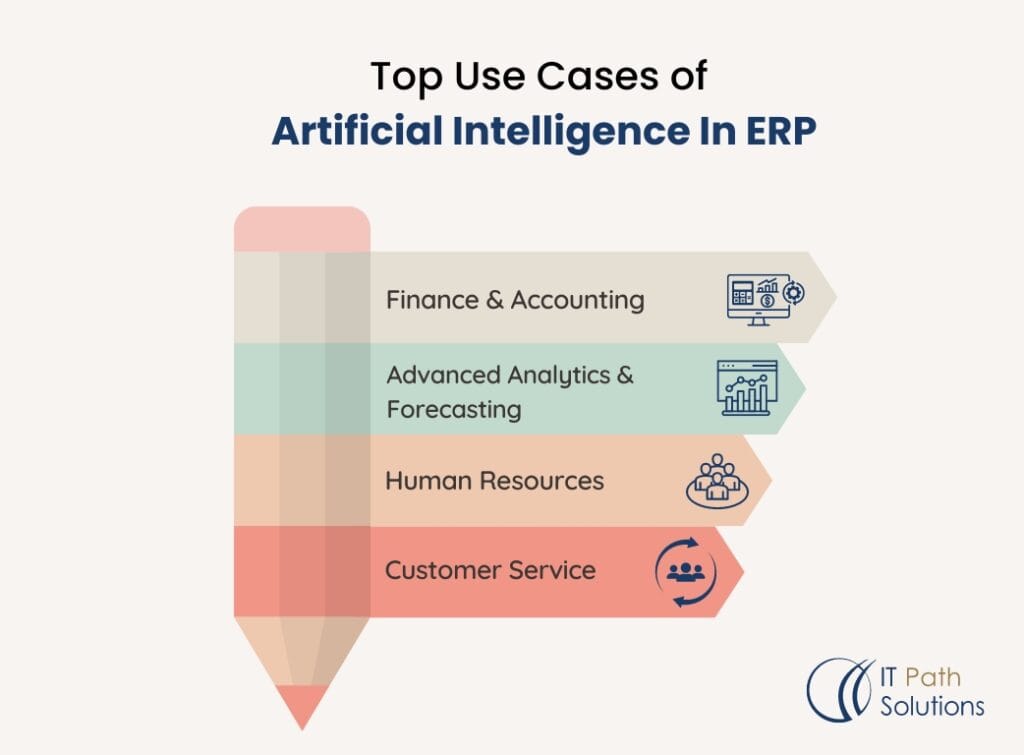
Finance & Accounting
In the area of finance and accounting, AI in Finance improves ERP systems by handling repetitive tasks like accounts payable, expenses, and reconciliations. It is accurate, efficient, and compliant to detect anomalies and fraud with machine learning algorithms.
Budgeting and financial planning, cash flow forecasting are some areas that benefit from predictive analytics to make the right financial decisions. AI assists in decreasing the workload and enhancing the quality of financial data and evolves the finance and accounting functions to optimize the results.
Advanced Analytics & Forecasting
Advanced analytics and forecasting with the help of AI are the cornerstone of contemporary ERP systems. These tools rely on data from the past and use algorithms to forecast future events, for instance, sale trends, market trends, and consumer trends. This kind of capability helps the business to forecast the quantities of products in the inventories, the production calendar, and the marketing strategies.
Another benefit of advanced analytics is that it gives insight into the operations of a firm, and this insight can be used to implement change management and improvement projects.
Human Resources
AI in HR solutions are disrupting HR in ERP systems by introducing intelligent solutions for talent attraction, employee engagement, and performance enhancement. AI and big data can be adopted in recruitment by scanning through the CVs, matching the candidates to the job offers, and screening the candidates.
AI makes it possible to measure the performance of employees, estimate the potential of turnover, and determine training requirements, thus improving the management of human capital.
The integration of AI in the HR processes will help businesses increase the levels of satisfaction and retention among employees and overall organizational productivity.
Customer Service
In customer service, the integration of AI in ERP systems results in better responses to customers and time-saving. AI-powered chatbots and virtual assistants give round-the-clock support for queries, order management, and problem-solving.
Customer feedback analysis is an important aspect of business since it enables organizations to change their strategies to favorably address customer concerns.
It is possible to predict customers’ needs and wants, which can help to provide better services and employ suitable advertisement strategies.
Read More:- How AI and Machine Learning Are Shaping Data Analytics
Benefits of Integration of AI in ERP Systems
The incorporation of AI in ERP systems has many advantages that improve the functioning of businesses and their processes. Here are some key advantages:
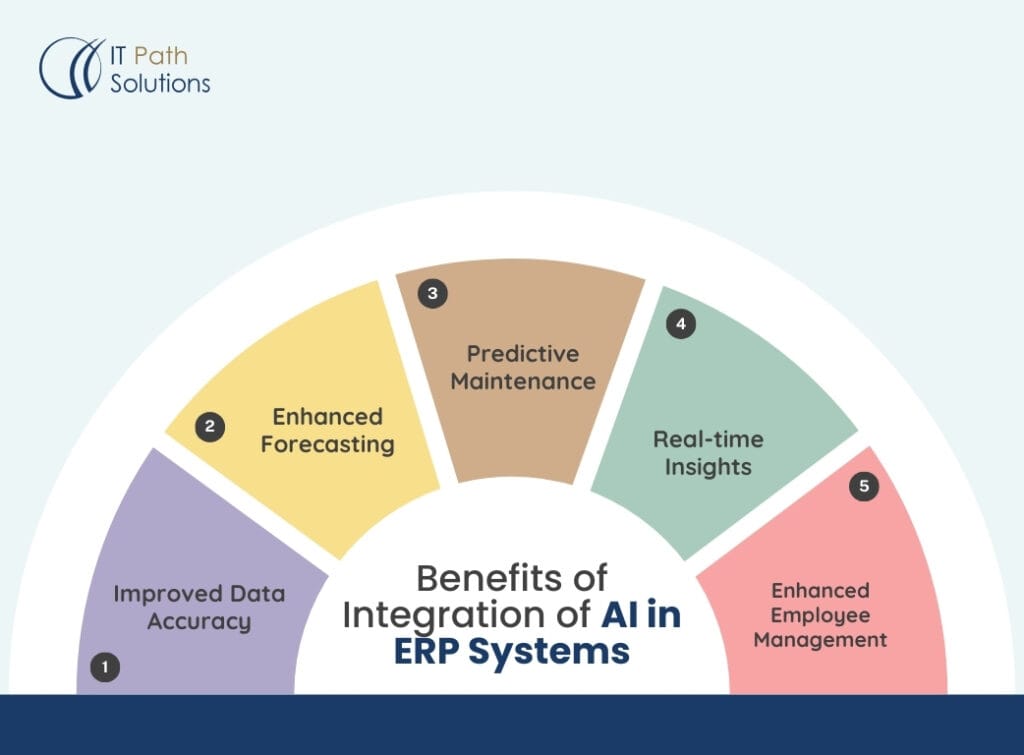
Improved Data Accuracy
AI minimizes errors that are likely to be made when entering data manually and makes sure that data are uniform throughout the system. Real-time data validation is performed by AI algorithms, which check the data for errors and make corrections wherever necessary, therefore increasing the reliability of such datasets.
Enhanced Forecasting
AI-based forecasting identifies historical sales patterns and market trends to give better estimation of future sales. Predictive models help in determining the revenue, expenses, and cash flow in advance, thus helping in efficient planning and budgeting.
Predictive Maintenance
AI enables users to track equipment and predict maintenance processes where the equipment may likely to fail and cause unnecessary downtime.
Real-time Insights
AI works on real-time data and delivers updated information that can be used to make timely decisions by businesses. The use of AI dashboards is a way of presenting large amounts of information in easily digestible formats so that the consumers of the information can make decisions based on the information they receive.
Enhanced Employee Management
Recruitment is made easier by resume filtering, candidate selection, and job fit prediction hence eliminating time wastage and increasing the quality of the candidates hired. AI monitors the KPIs of the employees and offers suggestions, and analysis of performance, thus increasing efficiency and satisfaction.
Are You Ready to Take Advantage of AI in ERP?
The integration of AI In ERP systems has the potential to revolutionize modern business operations. The power of AI technologies such as machine learning, natural language processing, and computer vision makes it possible for your business to be more efficient in its functioning and make sound decisions based on the obtained information. Partnering with IT Path Solutions enables your companies to leverage the power of AI in ERP systems. Our team of AI Developers is always ready to assist in choosing the proper tools for your business and implementing them into your ERP system. Get in touch today with our talented team to integrate AI-in ERP systems tailored to your specific business needs.
Keyur Patel
Co-Founder
Keyur Patel is the director at IT Path Solutions, where he helps businesses develop scalable applications. With his extensive experience and visionary approach, he leads the team to create futuristic solutions. Keyur Patel has exceptional leadership skills and technical expertise in Node.js, .Net, React.js, AI/ML, and PHP frameworks. His dedication to driving digital transformation makes him an invaluable asset to the company.
Get in Touch
Search
Blog Categories
